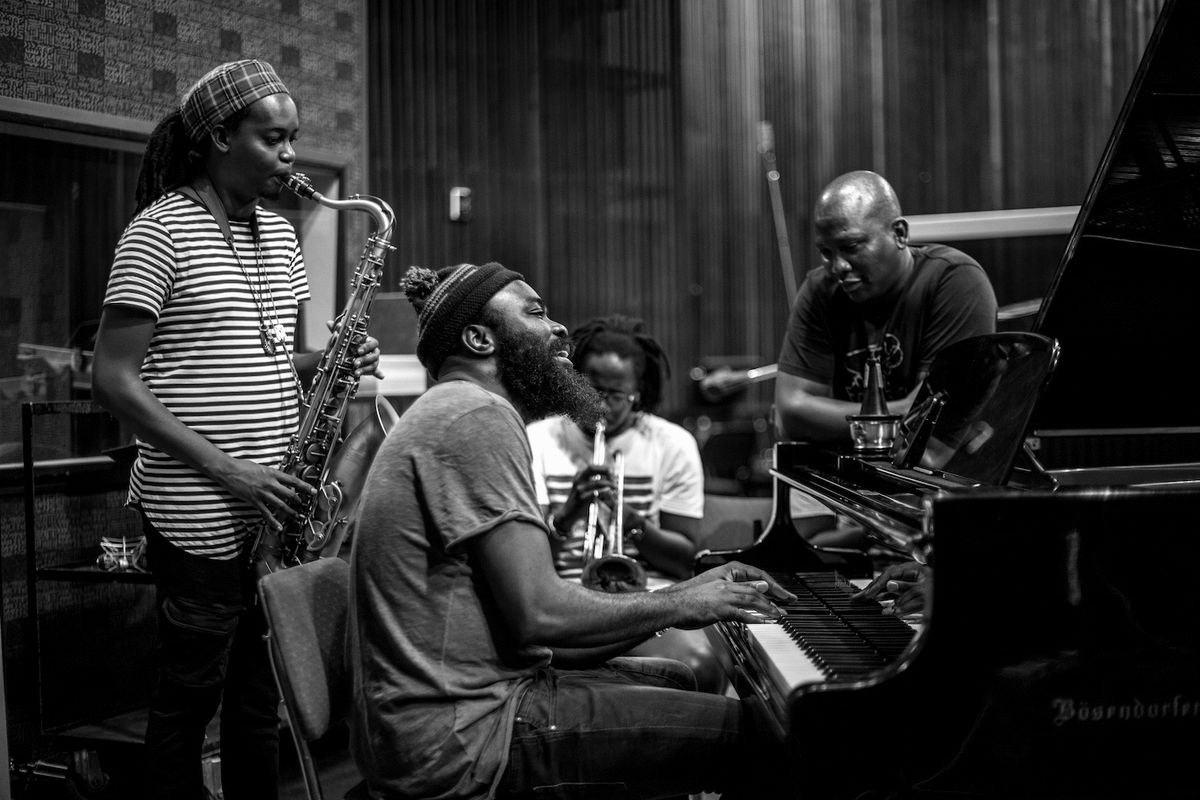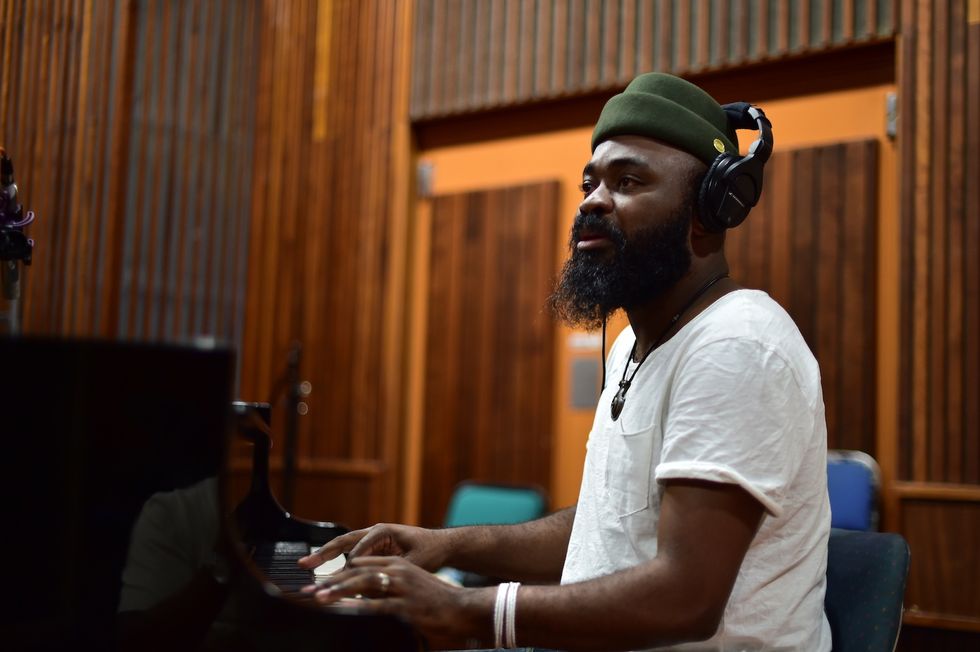Interview: South Africa's Nduduzo Makhathini On His Upcoming Blue Note Records Debut
We talk to the South African pianist about the otherworldly inspirations behind Modes of Communication: Letters from the Underworld and much more.

Nduduzo Makhathini has never needed the blessing of a major label to make and share his music.
The 37-year-old pianist from South Africa's Kwazulu Natal province started his own independent label with his wife, Omagugu, called Gundu Entertainment, six years ago. Through it, he released eight of his own albums, including Ikhambi, a record that became a turning point for Makhathini—it won a South African Music Award for Best Jazz Album and it was issued under Universal Music, through a licensing deal with Gundu.
After three years of courting Makhathini, the major label finally signed him in 2017, opening a pathway that led to this past year, when Makhathini became the first South African to sign to Blue Note, Universal's renowned American jazz imprint.
Joining the label that carries catalogues from Miles Davis and John Coltrane is an honor Makhathini believes could have been bestowed on any one of the greats of South African jazz. But as he sees it, it's an embrace beyond just any one individual. "More than it is for Nduduzo Makhathini, it is for the South African jazz community," he says. "To find its way into a greater portal of this music, and to find a voice within that, and to have a say in those jazz discourses that are broader, that are coming from the US."

Makhathini, a father of three who also heads up the music department at the University of Fort Hare, has been an active part of the story of jazz in contemporary South Africa and, indeed Africa, for almost a decade. Producing not just his own records, but those of others, and playing festivals, both local and international, as well as penning his thoughts about the genre for others to engage with, are all pieces of the quilt that connects his name to those jazz giants who have come before him — from Abdullah Ibrahim to the late Zim Ngqawana.
Discovering John Coltrane's A Love Supreme, while studying music at the Durban University of Technology, introduced Makhathini to McCoy Tyner, who played piano in Coltrane's band, and he soon after met his mentor, the late Bheki Mseleku, amongst South Africa's most revered jazz pianists. "There's a big connection, because if you think about it, Bheki Mseleku was influenced by McCoy Tyner," says Makhathini. "I think it's like we all love similar things—we love dance, we love percussiveness, we love storytelling. If you're interested in those three things, chances are you're going to sound like McCoy Tyner or Bheki Mseleku."
Mseleku, who Makhathini first met when he was 18, gave him more than just music inspiration. "He taught me a lot about ways of thinking," says Makhathini. "It's something that I'm very much aware of now, as a lecturer at the Fore Hare music department. I'm always thinking about: more than producing great musicians, how can we start producing great thinkers? And that's the Mseleku legacy there, he has given to us. How can we produce thinkers through the jazz matrix?"
Makhathini considers his coming to jazz at quite a late stage in life, something that was unplanned. As he explains it, he went to study music, not necessarily jazz. "I came through a jazz programme. It wasn't my choice but in retrospect, a lot of the music that I was familiar with—traditional music and a lot of the church music—was already dealing with a lot of concepts within jazz, but I just didn't know it was jazz," he says. "Culturally, through heritage and history, I was already dealing with improvisation, with spirituality, so all of these themes were already embedded within the music I knew. So I think jazz just maybe is a space that enhanced some of the things that I was dealing with in my culture, in my upbringing."
A practicing sangoma (traditional healer), Makhathini found he had the gift at age 13, but only really accepted it a decade later, finding it to be in conflict with having grown up in the church. "There's something to be said about going from a Christian background and these sort of religious clashes between the precolonial imaginations and what the colonial period presented, and how much of that has been absorbed into our system. And how the music was a space to sort of negotiate identity again," he says. When he realized it was an important gift that he had to consider, he recorded his third album, Listening to the Ground. "That album really is me questioning notions of God in the sky versus the idea of our ancestors and this continuous invocation to tribute to the ground; the idea of a god as something that's in the underworld instead of up in the sky, and how that notion helps us to liberate ourselves in terms of our construct of a god, as African people."

Makhathini continues these thoughts and ideas on the debut album he's recorded for Blue Note, called Modes of Communication: Letters from the Underworld, which is due out in April. "Since I accepted the gift, I've been receiving these kinds of texts from the underworld, and this album now tries to document that and say, 'what do these soundings and these projections, what do they look like?' and I tried to incorporate that into the album titles, images, the music, choice of personal liner notes, and my commentary on the album sleeve."
The album expands on many of the big questions Makhathini wrestles with—both in his music and in essays that he writes for his blog. He sees his music as a kind of other planet, a utopia. "A space that is untouched by inequality, untouched by racism, by classification, compartments," he says. "It's really a space where people are equals and it's about a collective memory that exists before all of these human-made constructs — of slavery, coloniality, apartheid, and all of these things. So my music really strives against those things."
It also acts as a link between those in the diaspora and those in the motherland. "This album creates a bridge over the Atlantic Ocean, also questioning other narratives that have existed—like the slave trade over the Atlantic Ocean and how water was used as a mode of transport into slavery. Within African cosmology, water is thought of to create a healing space, so we're reversing these narratives, questioning things, and confronting things."
Being signed to an internationally-recognized label like Blue Note means he can share both his music and his message with a wider audience. "We are in need of healing," says Makhathini. "I think I'm an important part in terms of how people start looking for healing in music, and I think this is something universal and urgent that is necessary." For sure, Nduduzo Makhathini has never need the blessing of a major label, but the major label—and we—are blessed to have him.
Modes of Communication is available for pre-order now.
- The 20 Best South African Songs of 2019 - OkayAfrica ›
- South African jazz ›
- 15 South African Artists to Watch in 2019 - OkayAfrica ›
- South African Women Dropped the Best Debuts of 2019 - OkayAfrica ›
- Today's Google Doodle Celebrates Late South African Jazz Legend ... ›
- Seba Kaapstad Is the Genre-Bending South African Jazz Band ... ›
- 15 South African Female Musicians Pushing the Boundaries ... ›
- In Photos: Documenting South African Jazz With Tseliso Monaheng ... ›
- South African Jazz Legend Hugh Masekela Has Died - OkayAfrica ›
- South African Jazz Legend Dorothy Masuka Has Died - OkayAfrica ›
- Asher Gamedze's Debut Is an Exploration of Continual Motion - OkayAfrica ›
- Kazi Ya Sanaa’s Debut EP ‘Prephase’ Is Rooted In Nostalgia - OkayAfrica ›
- In Photos: ‘Indaba Is’ Recording Sessions - OkayAfrica ›
- South African Jazz Artist Nduduzo Makhathini Releases Highly-Anticipated Blue Note Records Debut - OkayAfrica ›

